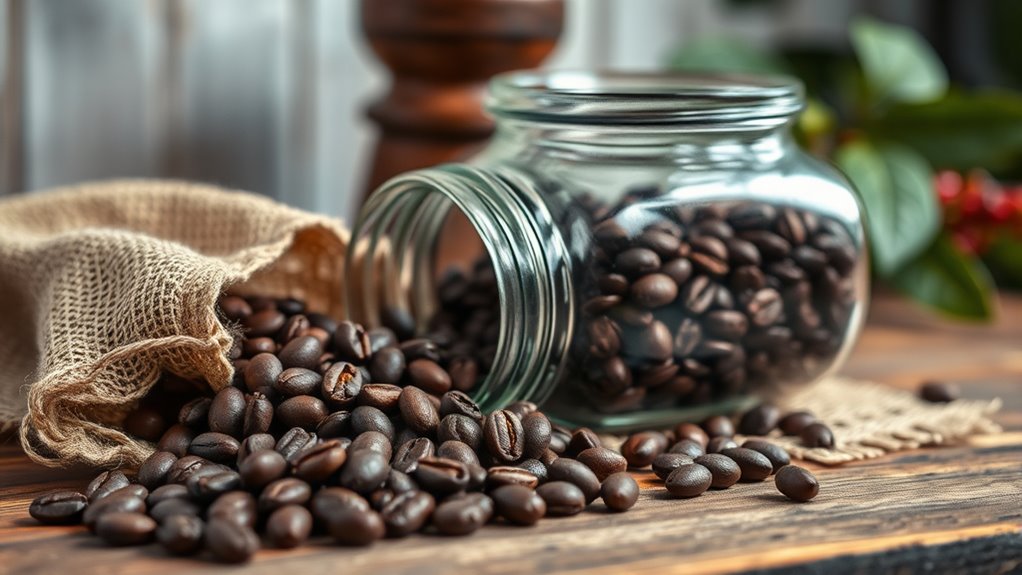To keep your coffee beans fresh, store them in an opaque, airtight container to protect against light, air, and moisture. Keep the container in a cool, dark place, ideally between 50 and 70 degrees Fahrenheit. Avoid the fridge unless they’re vacuum-sealed to prevent moisture absorption. For peak flavor, grind your beans just before brewing. Want more tips on preserving coffee freshness? There’s plenty more to discover about the best practices for your beans!
Key Takeaways
- Store coffee beans in an opaque, airtight container to block light and minimize air exposure.
- Keep beans in a cool, dark place with stable temperatures between 50 and 70 degrees Fahrenheit.
- Avoid storing coffee in the refrigerator or freezer unless vacuum-sealed to prevent moisture and odor absorption.
- Grind roasted coffee beans just before brewing to maintain their freshness and flavor.
- For long-term storage, freeze beans in airtight containers or vacuum-sealed bags and let them reach room temperature before brewing.
Ideal Coffee Bean Storage Conditions
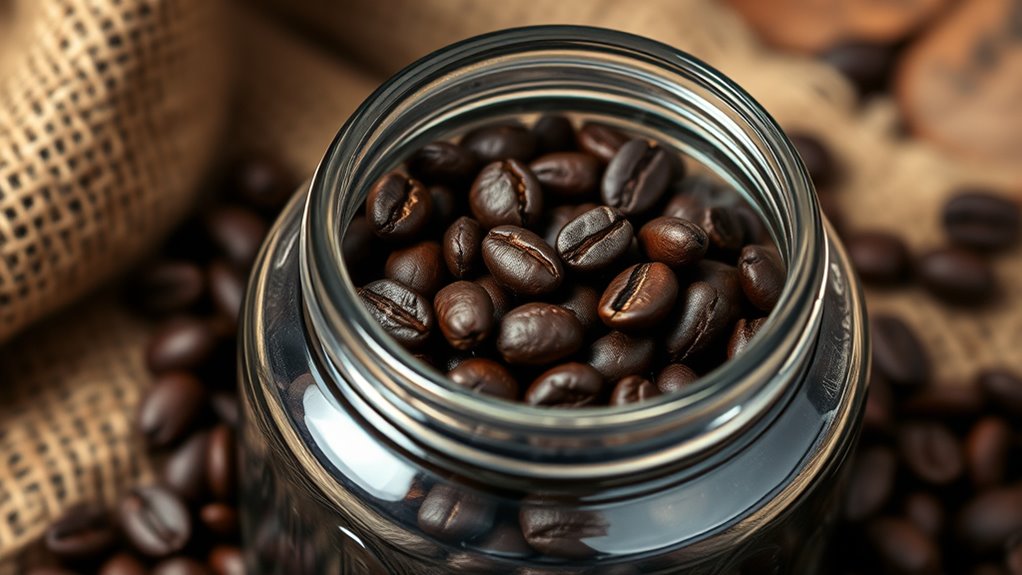
When it comes to storing coffee beans, keeping them fresh is essential for a great cup of coffee. To achieve ideal freshness, store coffee beans in an opaque, airtight container. This blocks light exposure and reduces air movement, both vital for maintaining your whole beans’ quality.
It’s best to keep your beans in a cool, dark place, ideally between 50 and 70 degrees Fahrenheit, to prevent temperature fluctuations that can degrade flavor. Avoid the refrigerator or freezer unless vacuum-sealed, as these environments can introduce moisture and odors, leading to freezer burn.
Finally, wait to grind your roasted coffee beans until just before brewing, since ground coffee oxidizes quickly and loses its freshness within minutes.
Freezing Coffee Beans
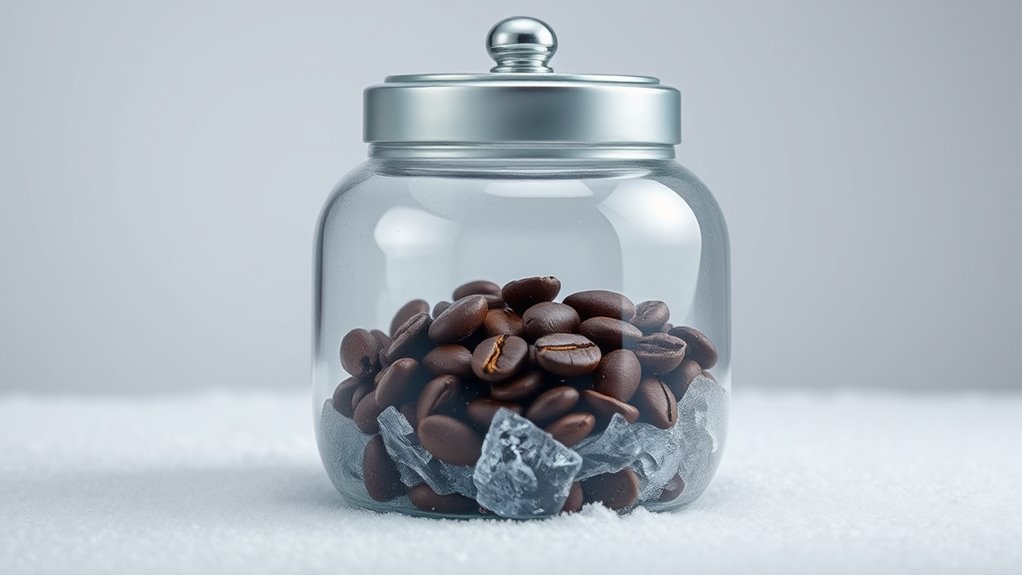
Although many coffee enthusiasts prefer keeping their beans at room temperature, freezing coffee beans can be a smart choice for preserving freshness, especially in humid climates.
When freezing, always use airtight storage containers or vacuum-sealed bags to prevent moisture absorption and freezer burn. This method helps maintain the flavor quality of your roasted coffee beans for long-term storage, typically up to 3 to 4 months.
However, avoid repeatedly thawing and refreezing your beans, as this can lead to moisture buildup and spoil the taste. Before brewing, let the frozen coffee beans reach room temperature to guarantee peak flavor extraction.
Avoid thawing and refreezing coffee beans to prevent moisture buildup that can ruin their flavor. Let them warm to room temperature before brewing for optimal taste.
With the right approach, freezing can be an effective way to keep your coffee fresh longer.
Does Coffee Expire?
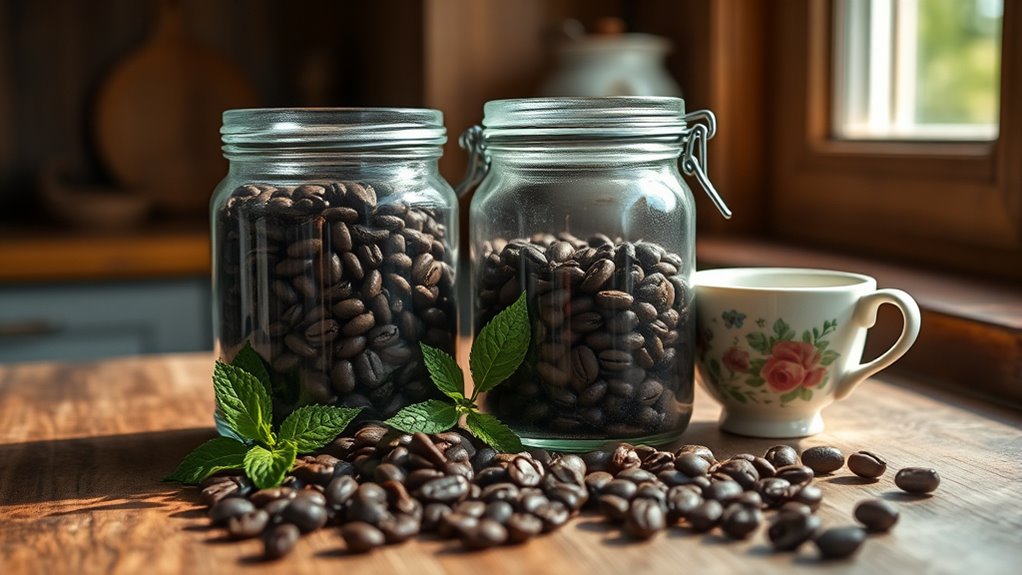
Have you ever wondered if coffee really expires? The good news is that roasted coffee beans don’t expire in the unsafe sense unless they’re exposed to moisture.
However, their freshness and flavor do decline over time. Whole beans can stay ideal for about 90 days when properly stored in a sealed bag, while opened packages should be consumed within 10-14 days for the best taste.
Ground coffee, on the other hand, oxidizes quickly and typically goes stale within 1-2 weeks at room temperature. Using an airtight seal or vacuum storage can help maintain flavor.
Just remember, if you see mold on your beans, it’s time to discard them. Enjoy your coffee while it’s still fresh!
How Long Does Coffee Last?
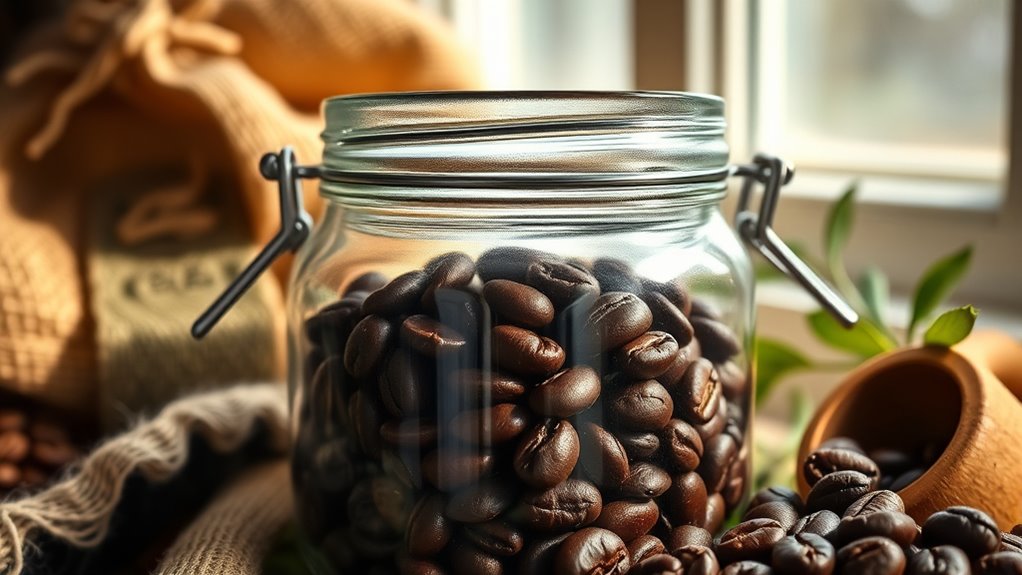
Coffee’s lifespan depends on how you store it. Unopened packages of roasted coffee beans can last until their best-by date, while opened beans typically stay fresh for 10-14 days.
If you keep roasted coffee beans at room temperature, they maintain ideal freshness for 1-3 weeks. Storing them in the freezer is the best way to store for extended freshness, lasting 3-4 months in an airtight container, preventing moisture absorption.
On the other hand, ground coffee only stays fresh for 1-2 weeks at room temperature due to oxidation. For freshly roasted coffee beans, you’ll enjoy prime flavor for about 90 days when sealed in their original packaging. Understanding the caffeine content in different coffee preparations can also influence how you enjoy your brew.
Proper coffee storage is key to enjoying your brew!
Best Practices for Maintaining Freshness
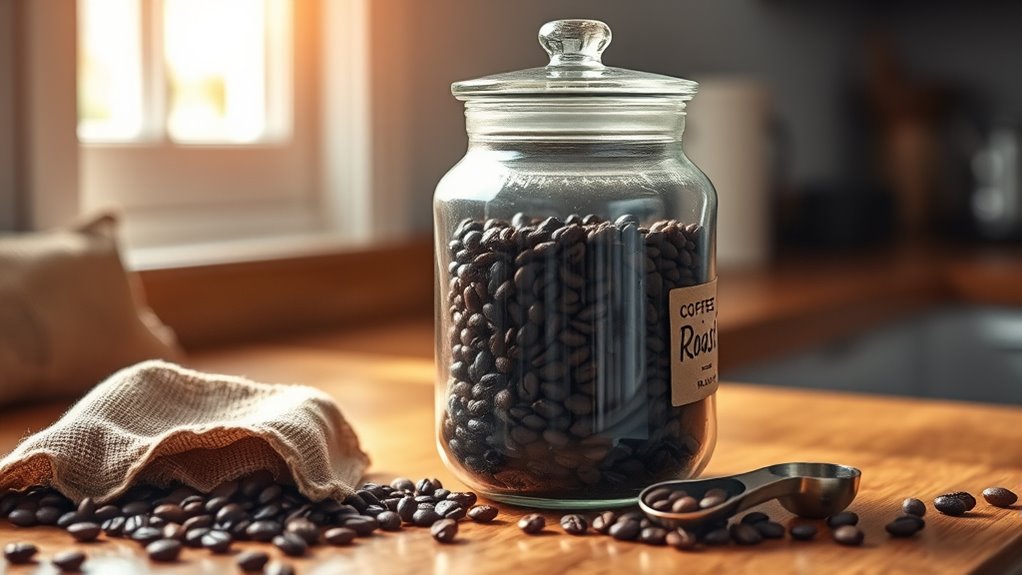
To truly enjoy the rich flavors of your coffee, it’s important to adopt best practices for maintaining freshness. Start by storing coffee in an airtight, opaque container to keep it protected from light, air, and moisture. Opt for a cool, dark place with stable temperatures, ideally between 50 and 70 degrees Fahrenheit. Remember to buy smaller batches of freshly roasted coffee, as it stays best within 2-4 weeks. Grind beans just before brewing to preserve their flavor. If you decide to store coffee in the freezer, vacuum seal it in small portions, letting it reach room temperature before brewing. Maintaining freshness is crucial, as air quality can affect how we perceive flavors. Additionally, consider the growing trend of sustainable fashion, as many eco-conscious brands are also mindful of their packaging, which can influence freshness.
| Practice | Description | Benefits |
|---|---|---|
| Airtight Container | Use an opaque, airtight container | Keeps coffee fresh |
| Buy Smaller Batches | Purchase frequently instead of in bulk | Guarantees peak flavor |
| Grind Before Brewing | Wait to grind until just before brewing | Preserves freshness |
| Freeze with Care | Vacuum seal small portions before freezing | Prevents moisture |
Frequently Asked Questions
What’s the Best Way to Keep Coffee Beans Fresh?
To keep your coffee beans fresh, you need to store them in an airtight, opaque container.
This protects them from light, oxygen, and moisture, which can ruin their flavor. Keep the container in a cool, dark place with a stable temperature.
Buy smaller batches to enjoy them within a few weeks, and grind your beans just before brewing for the best taste.
If you freeze them, make sure to vacuum seal portions first.
Should You Store Coffee Beans in the Fridge?
When it comes to coffee beans, you shouldn’t throw caution to the wind by storing them in the fridge. The fridge’s moisture and food odors can ruin their flavor.
Plus, temperature changes might lead to condensation, making your beans stale quicker than you think. Instead, keep them in an airtight, opaque container in a cool, dark place.
This way, you’ll guarantee your coffee stays fresh and tasty for your next brewing adventure.
What Is the Best Storage for Coffee Beans?
To keep your coffee beans fresh, you’ll want to store them in an airtight, opaque container.
This protects them from light, air, and temperature changes that can degrade their quality.
Find a cool, dark place away from heat and moisture for storage.
It’s best to buy small quantities of freshly roasted beans to enjoy peak flavor within a few weeks.
Grinding just before brewing will also enhance your coffee’s taste.
Should You Keep Coffee Beans in a Bag or Container?
You should definitely keep coffee beans in a container rather than the original bag.
While the bag might work for short-term storage, an airtight container is far better for maintaining freshness over time.
Choose a dark, opaque container made of glass or ceramic to block out light, which can age the beans.
Make sure to store it in a cool, dark place, and you’ll enjoy your coffee’s full flavor longer.
Conclusion
So, if you’re ready to treat your coffee beans like royalty—keeping them cozy in a cool, dark spot or even in the frosty embrace of your freezer—go ahead! Remember, they’re not just beans; they’re the essence of your morning ritual. You wouldn’t let your prized possessions wither away, would you? Just don’t expect them to stay fresh forever; after all, even the best beans have their expiration date. Cheers to your caffeinated adventures!
